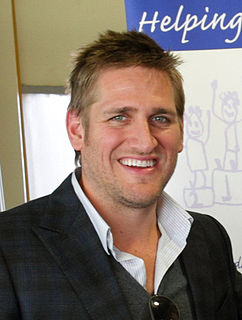A Quote by Jos Buttler
I have learned not to bother with no-carbohydrate diets or extreme nutritional strategies. It is much better to go for a balanced approach which you can make your long-term routine.
Related Quotes
Set realistic goals short and long term.
2. Plan an orderly and thorough routine to train the entire body.
3. Make a commitment to stick to your routine for four to six weeks to realize the changes and benefits, develop perseverance and create a habit.
4. Establish enthusiasm for your training, the driving force to perform successfully.
5. Ease into an appropriate training program with a wholesome, thoughtful nutritional plan: proper foods, amounts and order of consumption.
6. Be confident from the beginning that the application of these sound principles will produce the desired results.
I don't do very well with extremes of any kind - extreme diets, extreme fitness - so moderation makes a lot of sense, and Hershey's has really great portion-friendly desserts to help people incorporate treats into their lifestyles so they don't feel like they're depriving themselves and are still living a balanced life.
An important fact to remember is that all natural diets, including purely vegetarian diets without a hint of dairy products, contain amounts of calcium that are above the treshold for meeting your nutritional needs....In fact,calcium deficiency caused by an insufficient amount if calcium in the diet is not known to occur in humans.
You don’t get better on the days when you feel like going. You get better on the days when you don’t want to go, but you go anyway. If you can overcome the negative energy coming from your tired body or unmotivated mind, you will grow and become better. It won’t be the best workout you have, you won’t accomplish as much as what you usually do when you actually feel good, but that doesn’t matter. Growth is a long term game, and the crappy days are more important.
The thing that I learned early on is you really need to set goals in your life, both short-term and long-term, just like you do in business. Having that long-term goal will enable you to have a plan on how to achieve it. We apply these skills in business, yet when it comes to ourselves, we rarely apply them.



































